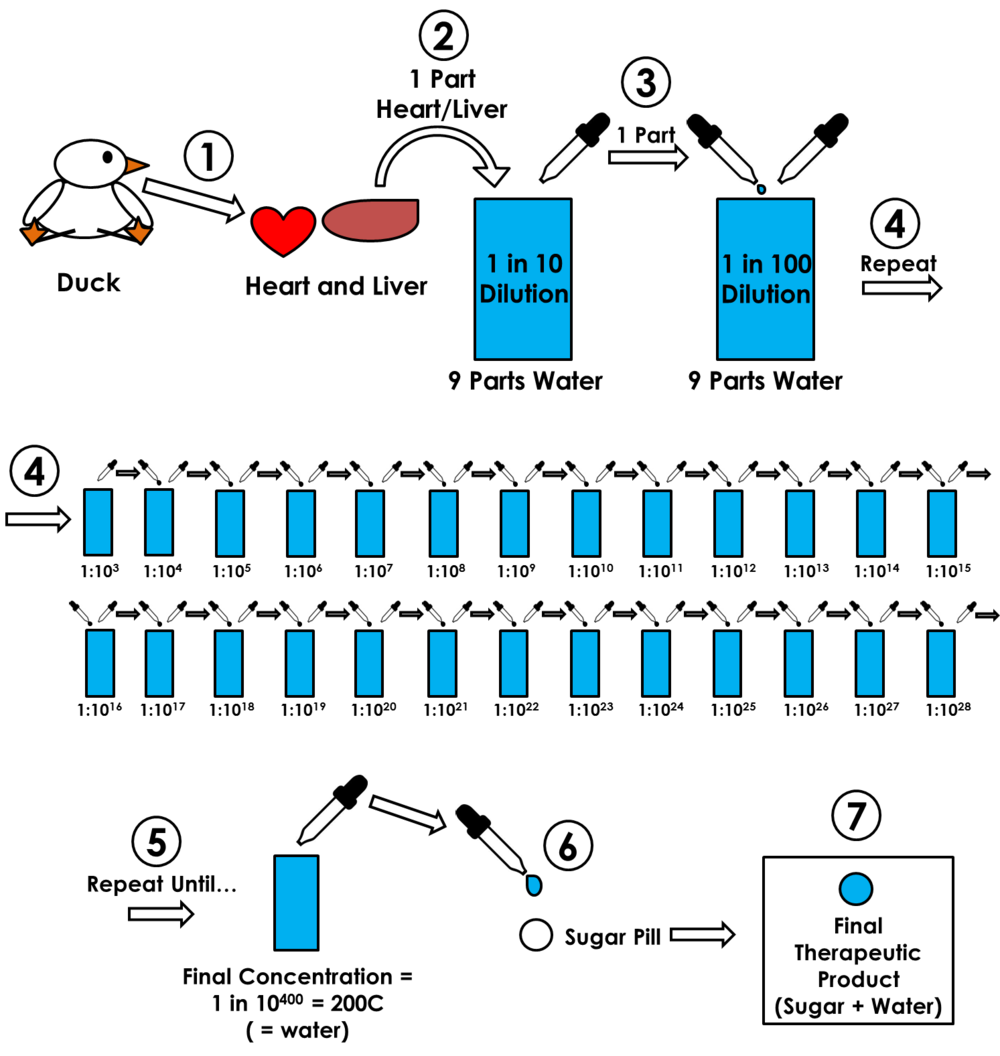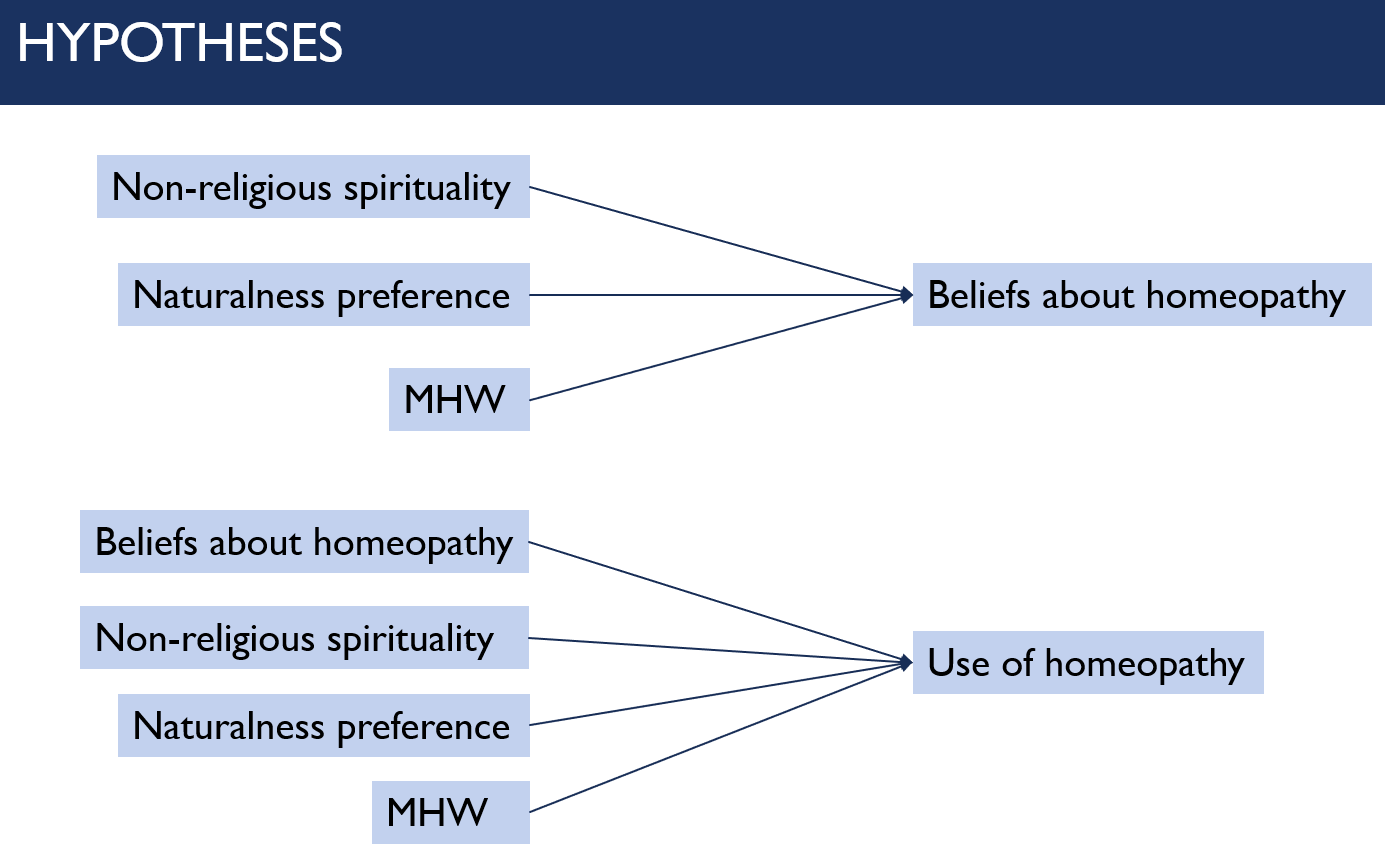Homeopathy is a complementary and alternative medicine (CAM) particularly popular in France where, according to a survey conducted by Ipsos in 2012, 56% of the population uses it. Homeopathic medicines are also refunded at 30% by the French social security and the Boiron laboratory makes 55% of its profits on the territory. However, many controversies surround this practice. Indeed, two meta-analyses conducted in 2005 and 2015 showed its inefficiency, which is now consensual in the scientific community. Recently,124 health professionals have signed a petition to claim that the social security should stop refunding homeopathic medicines and to point out the problems involved by this type of medecine. This petition pushed the Health Minister Agnès Buzyn and the French Medical Association to clarify their position towards homeopathy.

Given this paradox and the ethical, political and health implications involved by homeopathy, it seems interesting to try to understand what can influence its use and the beliefs holded by individuals about this alternative medicine. This study therefore aims to shed light on this question by taking into account the role played by Non-religious Spirituality, Naturalness Preference and Modern Health Worries (MHW).
What are Non-religious Spirituality, Naturalness Preference and Modern Health Worries?
The authors find difficulties to define spirituality and distinguish it from religion (MacDonald, 2000; Roussiau, Bailly & Renard, 2018). Spirituality would be composed of various dimensions such as the search for the meaning of life, transcendence, the notion of “sacredness”, altruism, connection with nature and wonder. Several authors suggest that spirituality can exist in the absence of religion although the opposite isn’t true. Such spirituality could be described as “non-religious”.
Naturalness Preference (also called Naturalness Bias) can be defined as a bias, a tendency to prefer the “natural” alternative rather than the “unnatural” alternative to the same entity, whereas these alternatives are identical in all aspects (Li & Chapman, 2012; Dibonaventura & Chapman, 2008). Among other things, this bias is observed in the field of health (Rozin et al., 2004).
“Modern Health Worries” (MHW) include concerns about technological and scientific advances. For example, it can be pollution, pesticides, drugs, GMO, etc. These aspects of modernity represent new dangers for their health (Petrie, Sivertsen, Hysing, Broadbent, Moss-Morris, Eriksen & Ursin, 2001).
Issues raised
In 2004, Petry and Finkel suggest a link between the choice to consult CAM therapists and spirituality. However, these authors rely on a spirituality that includes the notion of religion although there seems to be no link between religion and the use of CAM (Jeswani & Furnham, 2010; Furnham, 2007). These elements may lead us to wonder about a possible link between the use of homeopathy specifically and non-religious spirituality.
Patients who use homeopathy justify its use because for them it is a “natural medecine” (Ipsos, 2012). However, according to Jeswani & Furnham (2010), there doesn’t appear to be a link between beliefs about MAC effectiveness and environmental concerns. Patients may be more interested in the benefits they can get from nature than in the protection of the environment. In this case, the notion of naturalness preference seems more suitable to explain these beliefs and behaviors.
Furnham (2007) and Jeswani & Furnham (2010) have shown that those with the most MHW are more likely to use CAM frequently and to believe in their effectiveness. Unfortunately, these results can’t be generalized to the use of homeopathy.
Hypotheses
The multiple hypotheses of this study can be summarized in this way:
In the first part, Non-religious spirituality, Naturalness preference and MHW explain various beliefs about homeopathy.
In the second part, all of these previous variables (i.e. Non-religious spirituality, Naturalness preference, MHW and beliefs) explain the use of homeopathy.

Methodology
367 participants completed an online questionnaire with four parts measuring their degrees in various beliefs about homeopathy, Non-religious spirituality, Naturalness preference and MHW. These participants were on average 33.34 years old. Homeopathy users accounted for 46.87% of study participants while nonusers accounted for 53.13%.
Results
The results of this study show that, in line with expectations, the more individuals show an non-religious spirituality, a naturalness preference, and higher MHW, the more likely they are to believe that homeopathy is a “natural method.”, which helps to “relieve symptoms” and “improve emotional and physical well-being”. The use of homeopathy can in turn be explained by all of the previously mentioned variables except for the belief that homeopathy is a natural method.
This study shed light on the elements that may have contributed to the popularity of homeopathy by the French public. It invites future studies to ask the question of the mistrust maintained by some individuals related to conventional medicine, which may even lead to rejection.
Words I have learned :
- Refunded = remboursé
- shed light = éclairer, clarifier
- Non-religious Spirituality = spiritualité areligieuse
- Naturalness Preference = Préférence pour le naturel
- Wonder = émerveillement
Bibliography
Dibonaventura, M. daCosta, & Chapman, G. B. (2008). Do decision biases predict bad decisions? Omission bias, naturalness bias, and influenza vaccination. Medical Decision Making: An International Journal of the Society for Medical Decision Making, 28(4), 532‑539. https://doi.org/10.1177/0272989X07312723
Li, M., & Chapman, G. B. (2012). Why Do People Like Natural? Instrumental and Ideational Bases for the Naturalness Preference. Journal of Applied Social Psychology, 42(12), 2859‑2878. https://doi.org/10.1111/j.1559-1816.2012.00964.x
MacDonald, D. A. (2000). Spirituality: Description, Measurement, and Relation to the Five Factor Model of Personality. Journal of Personality, 68(1), 153‑197. https://doi.org/10.1111/1467-6494.t01-1-00094
Petrie, K. J., Sivertsen, B., Hysing, M., Broadbent, E., Moss-Morris, R., Eriksen, H. R., & Ursin, H. (2001). Thoroughly modern worries: the relationship of worries about modernity to reported symptoms, health and medical care utilization. Journal of Psychosomatic Research, 51(1), 395‑401.
Roussiau, N., Bailly, N., & Renard, E. (2018). Construction et validation d’une échelle de spiritualité explicite areligieuse.
Ipsos. (2012, février). L’homéopathie fait de plus en plus d’adeptes. Consulté le 4 janvier 2018, à l’adresse https://www.ipsos.com/fr-fr/lhomeopathie-fait-de-plus-en-plus-dadeptes
Jeswani, M., & Furnham, A. (2010). Are modern health worries, environmental concerns, or paranormal beliefs associated with perceptions of the effectiveness of complementary and alternative medicine? British Journal of Health Psychology, 15(Pt 3), 599‑609. https://doi.org/10.1348/135910709X477511
Rozin, Paul, Spranca, M., Krieger, Z., Neuhaus, R., Surillo, D., Swerdlin, A., & Wood, K. (2004). Preference for natural: instrumental and ideational/moral motivations, and the contrast between foods and medicines. Appetite, 43(2), 147‑154. https://doi.org/10.1016/j.appet.2004.03.005
Furnham, A. (2007). Are modern health worries, personality and attitudes to science associated with the use of complementary and alternative medicine? British Journal of Health Psychology, 12(Pt 2), 229‑243. https://doi.org/10.1348/135910706X100593